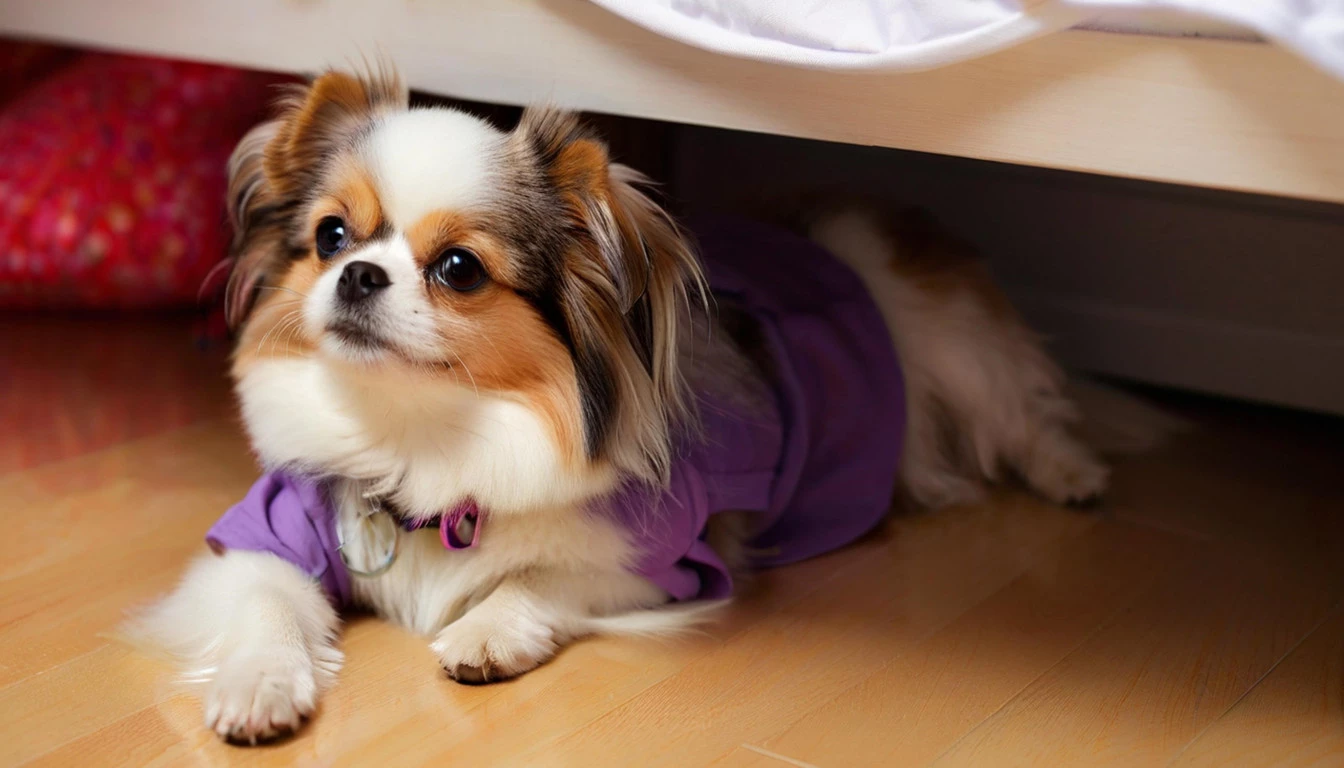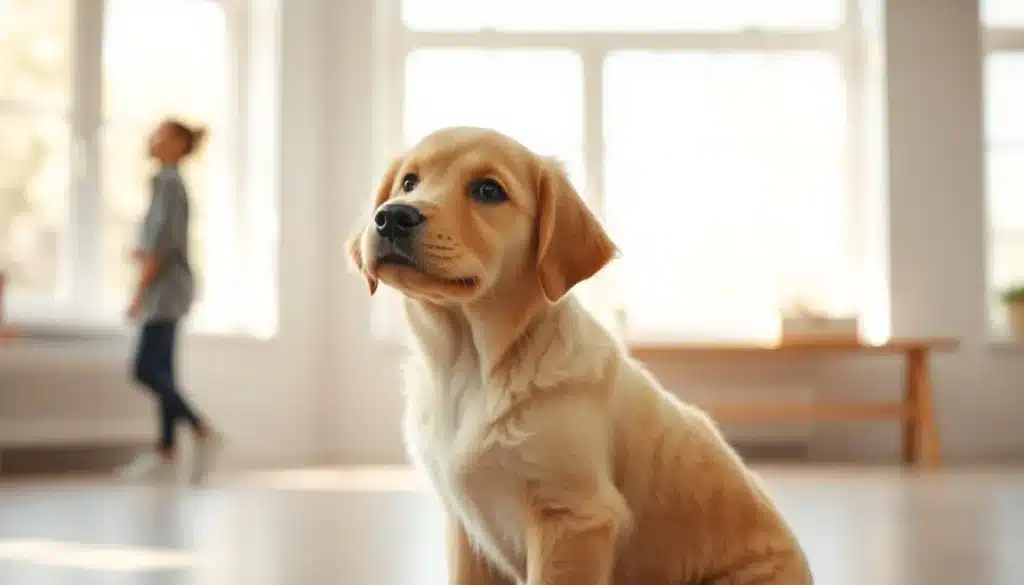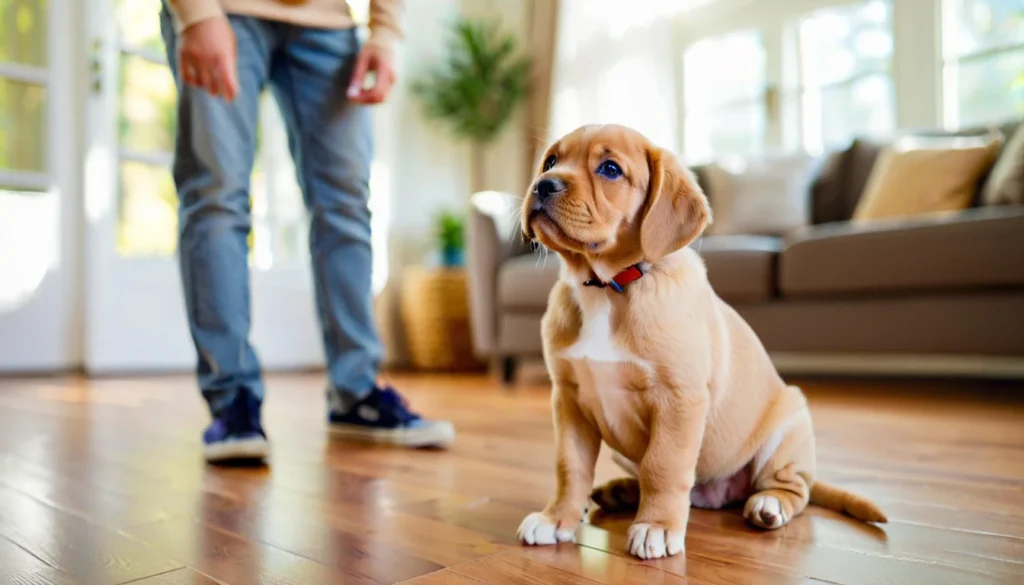Ever wondered why your dog loves to sleep under your bed? I did when I first saw mine snuggled up there. It seemed odd but also sweet. As I watched, I learned it's not just a quirk. It's a sign of their need for safety and comfort.
Dogs seek out places that feel like home. This behavior comes from their instincts and history. By understanding this, our bond grew stronger. It also helped my dog feel more secure.
Key Takeaways
- Dogs seek safety and security in familiar spaces.
- Instinctual behaviors can influence sleeping habits.
- Understanding this behavior can strengthen your bond with your pet.
- Environmental factors often contribute to where dogs feel comfortable sleeping.
- Providing alternative cozy spaces can accommodate your dog's needs.
Understanding Canine Behavior
Understanding dog behavior is key to knowing where my dog likes to sleep. Dogs sleep habits come from their instincts and emotional needs. They often choose dark or hidden spots, like under the bed, for safety and comfort.
This knowledge helps me care for my dog better. Dogs seek secure places to sleep, showing in different ways. By understanding this, I can make our home better for them. Knowing what affects their sleep helps me meet their needs better.
Why Does My Dog Sleep Under My Bed
Many pet owners wonder why their dogs sleep under the bed. This behavior is linked to their natural instincts. Dogs often choose enclosed spaces to sleep, just like their wild ancestors did.
This helps us understand why they find these spots so comforting and secure.
Natural Instincts in Dogs
Dogs naturally look for safe and cozy places to rest. This behavior comes from their wolf ancestors, who used dens for shelter. Sleeping under the bed is a modern way for dogs to feel safe.
When my dog goes to this spot, it's like they're in a protective shelter. It reminds them of the safety they once had in a den.
Connection to Ancestry and Denning
There's a deep connection between dogs sleeping under the bed and their ancestors. Wolves used dens to protect themselves from dangers and harsh weather. My dog does the same under the bed, seeking safety and comfort.
This instinctual behavior is a comforting ritual for them. It aligns with their natural nature.
Seeking Comfort and Security
Wondering why your dog likes sleeping under your bed? It's about their needs. Dogs look for comfort and security, especially when stressed. The space under the bed feels like a safe place, away from daily chaos.
Here, they can find a safe space while staying close to their loved ones.
Dog's Need for a Safe Space
Dogs naturally seek safe and secure areas. Sleeping under the bed makes them feel protected and close to their owner. This behavior is driven by instinct, as dogs prefer covered spaces.
It shows their need for a place to relax and recharge.
Familiarity with Owner's Scent
The closeness to their owner is key to a dog's happiness. Their owner's scent brings comfort and warmth. This bond shows their love and how scent affects their sleep choice.
When they sleep under the bed, they enjoy their safe space and their owner's smell.
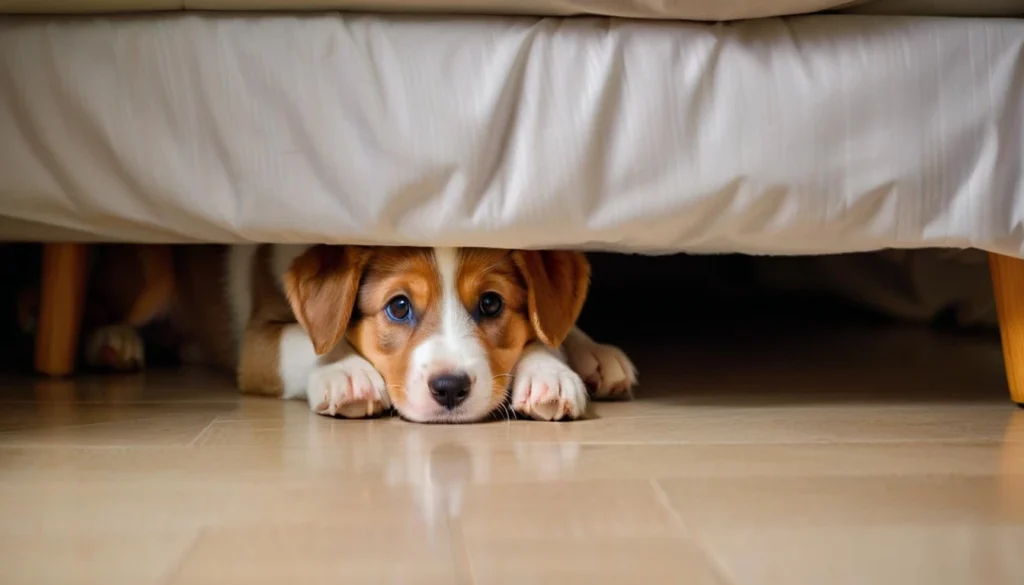
Temperature Regulation
Understanding how dogs regulate their body temperature is key to their sleep patterns. I often wonder why my dog sleeps under my bed at night. It's because temperature is a big factor. Dogs naturally look for spots that help them stay at the right body temperature.
Coolness Under the Bed in Hot Weather
In the summer, my dog goes under the bed to stay cool. The bed's shade creates a cozy spot for him. It helps him keep his body temperature just right. I'm glad he picks this spot instead of the hot sun.
Warmth in Cold Seasons
Winter brings its own challenges for keeping warm. My dog also goes under the bed to stay warm. The materials around it act as natural insulators. This keeps him cozy while he sleeps.
A Private Retreat: Safety and Privacy
Many dogs find comfort in secluded spaces, just like us. When my dog keeps going under the bed, it's his way of finding a private spot. This hidden area gives him a sense of safety and security he loves.
Avoiding Household Activity
In a busy home, distractions can be too much. My dog goes under the bed to get away from loud noises, energetic kids, or other pets. This spot is especially important for dogs who need their alone time. It lets them relax and recharge.
Seeking Solitude from Stressors
Anxious dogs need solitude more than ever. When they're stressed, they seek quiet places to hide. Giving them access to these spots respects their need for sleep and helps them relax when they need to.
Habit Formation and Routine
Understanding how dogs develop their sleeping habits can provide insight into their routines. Many dogs, including mine, tend to seek out familiar and comfortable spots. This often leads them to hide under the bed. This behavior reflects an interesting aspect of habit formation in dogs.
They can become accustomed to sleeping in specific areas that once offered them comfort and security.
How Dogs Develop Sleeping Habits
Dogs are creatures of habit, often forming routines that revolve around their sleeping patterns. When my dog finds a particular location, like under the bed, to be cozy and safe, they may return to it repeatedly. This association creates a strong connection between the space and positive feelings.
Understanding why does dog hide under bed can help in recognizing their needs for familiarity and security.
Encouraging New Sleeping Areas
If I want to change my dog's sleeping habits, there are several techniques I can employ. Creating new sleeping spots that are cozy and inviting is key. This can be achieved by:
- Introducing a new dog bed in a quiet area.
- Utilizing soft blankets or pillows to make a space more comfortable.
- Placing the new sleeping spot near where I often spend time, providing a sense of security.
When encouraging new sleeping spots, it is important to be patient. Positive reinforcement, such as treats or praise when my dog explores the new area, can foster an interest in those locations. This helps break the routine of slipping under the bed.
By doing so, I can support my dog's habit formation in dogs and guide them into new, cozy sleeping arrangements.
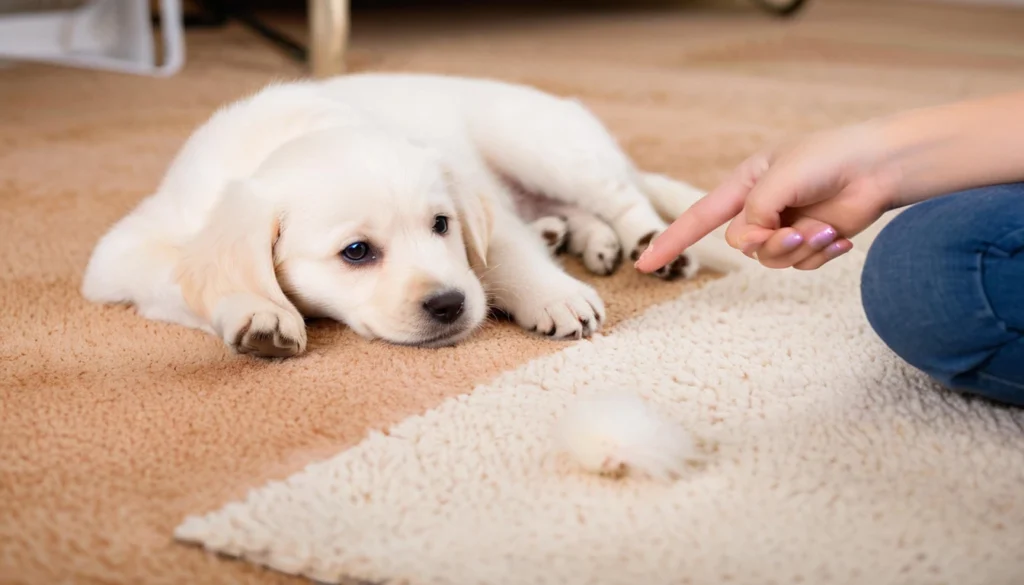
Coping with Fear and Anxiety
Many pets hide due to fear or anxiety. When my dog hides under the bed, it worries me. Different things can cause this, like loud noises or being away from their owners.
Knowing what triggers their fear helps me manage their anxiety better.
Responses to Loud Noises
Thunderstorms, fireworks, or even the vacuum can scare dogs. They often hide in safe spots like under the bed. This helps me make a quieter space for them when it's loud.
Separation Anxiety in Dogs
When I leave, my dog might get upset or make noise. They might hide in their favorite spot. Knowing these signs helps me make them feel safer, which might reduce hiding.
Medical Concerns and Why Your Dog Hides
I often wonder why my dog likes to hide. Sometimes, it's a sign of health issues. When they hide in tight spots, it might mean they're not feeling well.
Signs of Illness in Dogs
It's important to watch for signs of illness in pets. Look out for changes like:
- Lethargy or decreased energy levels
- Loss of appetite
- Unusual vocalizations or whining
- Excessive hiding or seeking secluded spots like under the bed
Spotting these signs early can help treat health issues quickly.
Seeking Comfort During Pain
When my dog is in pain, they seek comfort in safe places. This is why they hide under the bed. Giving them a safe space can ease their anxiety when they're not feeling well. It's key for us to understand their needs during tough times.
How to Encourage Alternative Sleeping Options
Changing your dog's sleeping spot from under the bed to a better place takes effort. The key is to make inviting spaces and use positive reinforcement. This approach creates a loving home and helps your dog learn new habits.
Creating a Cozy Dog Bed Space
To get my dog to sleep in a new spot, I made a cozy bed area. It's crucial to pick a bed that fits your dog's size and how they sleep. Place it in a quiet spot to keep them comfortable.
Adding familiar blankets or toys makes the space feel safe and personal. I also used treats and praise to encourage my dog to use the bed. This method is great for making spaces dog-friendly.
Positive Reinforcement Techniques
When my dog chose the bed over under the bed, I gave treats and praise. This positive feedback helps them learn that sleeping in the bed is good. Doing this consistently helps them get used to the new spot.
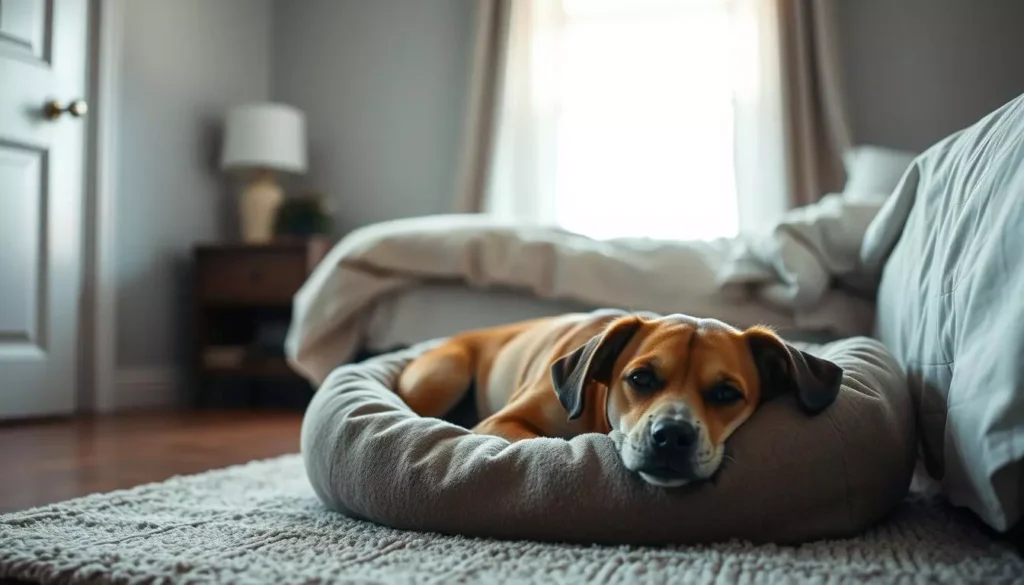
Impact of Household Environment
The home environment greatly influences a dog's behavior and where they like to sleep. Things like household noise and other pets can change where dogs choose to rest. It's important to understand how the environment affects dogs to make sure they feel safe and relaxed at home.
Noise Sensitivity and Its Effects
Many dogs are sensitive to noise in the home. Sounds like loud TVs or kids playing can stress them out. This stress might make them look for quieter places to sleep, like under the bed.
I've seen my dog avoid noisy areas. This has made me look for ways to reduce loud sounds in our home.
Climate Control in Your Home
The temperature in the house affects my dog's comfort a lot. Keeping the dog comfortable means keeping the temperature right for them, especially in extreme weather. If it's too hot or too cold, a dog's behavior can change a lot.
Using good air conditioning or heating helps control the climate. It also makes sure my dog has a peaceful place to rest.
Specific Breeds and Their Sleeping Preferences
Different dog breeds sleep in unique ways. This is based on their size and natural instincts. Knowing these differences helps me make my pets' sleep areas the best they can be.
Small Breeds vs. Large Breeds
Small dogs like Chihuahuas and Pomeranians love cozy spots. They often sleep under furniture. This is because they feel safe in tight spaces.
On the other hand, big dogs like Golden Retrievers and Great Danes need more room. They stretch out and stay cool in open spaces.
Breeds with Strong Denning Instincts
Some dogs, like Dachshunds and Terriers, have a strong urge to sleep in dens. This comes from their hunting past. They want a safe place to rest.
Beagles, however, are more flexible. They like both open and snug spots. Knowing this helps me create a cozy home for them.
| Breed | Size | Sleeping Preference | Denning Instinct |
|---|---|---|---|
| Chihuahua | Small | Cozy, confined areas | Strong |
| Golden Retriever | Large | Open spaces | Moderate |
| Dachshund | Small | Enclosed, den-like spaces | Very Strong |
| Beagle | Medium | Flexible; sometimes open, sometimes snug | Moderate |
| Pomeranian | Small | Tight, comforting spots | Strong |
Strategies for Managing This Behavior
As a dog owner, I face challenges when my dog sleeps under the bed too much. This behavior can be annoying. So, I look for ways to manage it. One key step is to create safe spaces in my home for my dog.
Providing Safe Spaces Beyond Under the Bed
It's important to give dogs safe places to sleep. I set up cozy corners with dog beds, blankets, and toys. This gives my dog a sense of security without being stuck under the bed.
I also make quiet areas away from busy spots. This helps my dog relax in different places.
Consulting with Professionals
At times, I'm unsure about my dog's behavior. That's when I know I should seek professional help. A dog trainer can give me specific ways to change my dog's behavior.
If I see signs of anxiety or fear, I talk to a vet. They can offer advice or behavioral therapy. This helps keep my dog happy and strengthens our bond.
Monitoring Behavioral Changes
Understanding and monitoring dog behavior is key to my dog's happiness. If my dog starts sleeping under the bed more, it might mean something's wrong. It's important to watch for these dog behavioral changes because they could mean stress or health problems.
When to Be Concerned About Changes
When I see my dog hiding more or acting uneasy, I know it's time to pay attention. These changes can be signs of stress or other issues. Some signs to watch for include:
- Increased hiding or seeking shelter
- Avoidance of usual activities
- Changes in eating or drinking habits
- Excessive barking or whining
By spotting signs of stress in dogs, I can take steps to help. This might mean a vet visit is needed.
Understanding New Triggers for Behavior
Finding out what causes these changes is crucial. Stressors can be different things, like:
- Environmental changes, such as new sounds or smells
- Social changes within the household
- Health-related issues that may cause discomfort
When I notice changes, I think about what's new and what's different. This helps me keep my dog's environment calm and stress-free.
Selecting the Right Dog Bed
Choosing the right dog bed is key. Comfort is essential for my dog's restful sleep. A good bed fits my dog's size and weight and offers support for a cozy sleep.
The importance of comfort for dogs is huge. It affects their behavior and health.
Importance of Comfort and Size
Dog beds come in many shapes and sizes. It's important to pick one that fits my dog's needs. A bed that's the right size lets my dog stretch and curl up comfortably.
Beds with memory foam or supportive materials help with pressure points. This makes the bed more comfortable. Knowing the importance of comfort for dogs leads to happier, healthier pets.
Creating a Den-Like Environment
Creating cozy spaces for dogs can improve their sleep. A bed with high sides feels like a den, giving my dog security. Adding blankets or familiar toys makes it even better.
These small touches can make a big difference. They encourage my dog to choose their bed instead of hiding under the bed.
Conclusion
Understanding why dogs sleep under the bed is key. It's about their natural instincts and need for comfort and security. By knowing this, we can make our homes better for them.
Dogs sleep under the bed for many reasons. It might be for the coolness or to have some privacy. I try to give them other cozy spots to sleep, so they don't feel scared or anxious.
Knowing what makes our dogs sleep well is important. It helps them feel safe and happy. This also makes our bond with them stronger.

